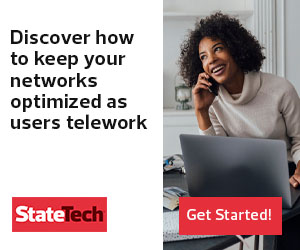STATETECH: Now, you’ve got this workforce of teleworkers. Is that the new normal in Georgia? And you mentioned during the NASCIO Midyear Conference that you might expand to hiring virtual workers, being able to tap a workforce that isn’t even physically nearby anymore. What does that look like going forward?
RHODES: I'll answer that in a couple of ways. As for teleworking statewide, it’s really going to depend on the job function within an agency. For some federal agencies that have relaxed some of their rules, I can see where some of those might tighten back up in the future to where, say, someone dealing with tax information should really be in a controlled environment. So, those will be the exception if there’s some external force driving us to do something differently.
We also have to consider, is it likely that there’s a round two of this at some point? If you think about how long it typically takes a vaccine to be developed and tested, assuming that one can be, a normal timeline on that would be a couple of years. They’re going to try to do that more quickly, but more likely than not, we will have another round of this.
We’ll be able to much more easily operationalize this, where the next round will be more fine-tuning. I know that if I look just at my agency, at the group that has been working remotely two to three days a week previously, there’s really no issue with those groups of individuals. Then, I’d look to my finance and accounting group, which has never really worked remotely because they need to be able to touch paper. But they’re working remotely today, so we've found ways to get around some of those hurdles.
So, I do think it will be a hybrid plan. There’s real merit, and you’re going to see a shrinking footprint of the state government from a facilities standpoint. That won’t change going forward. And it really can help make the most of a smaller budget as you reduce some of those footprints.
There are a lot of great benefits to that. We’ve mentioned a few of them, like just being able to attract a worker who lives in a rural part of the state. The ability to come and work for our agency could be a huge benefit for somebody who’s got the skill set that we’re looking for and maybe they don’t have as many opportunities in the local industry. Atlanta, in the technology space, prior to this emergency, was at near full employment. In some of our cybersecurity fields, we had a negative employment rate here in Georgia. So, that can benefit us.
STATETECH: Are there decisions you made previously that really paid off in this situation, in addition to the laptops?
RHODES: If you just look back to our accomplishments in our modernization effort, you won’t find servers that are older than 60 months in our environment. Desktops are refreshed every 60 months; laptops every 36 months. The process is in place to patch and update them. Our service desk handles most of our repairs. I think over 80 percent are done just on the phone, and no one ever needs to be dispatched.
Many of those items have been operationalized for years. Having a very standardized environment makes it easier to address. We almost had a lights-out data center before we even got to the discussion of embracing cloud solutions. So, if we have an issue with a server in a data center, 99 percent of the time, no one ever goes and touches that server; it’s done remotely by someone who may even be outside the state. And so, depending on what the issue is, they might need the Red Hat resource or someone who would be able to work on a particular issue. But all of that’s done remotely. So, we could care less if the person’s at home or in their office.
MORE ON STATETECH: Revisit our NASCIO Midyear Conference coverage.
STATETECH: Do you have an IT wish list? And if so, does it look different now than it did a few months ago? Has this situation revealed any sort of things that you would like to implement?
RHODES: Had our entire enterprise been laptops, this would have been a much easier battle because that was truly the hardest item to tackle. The supply chain was beyond capacity. So, if you didn't already have something in the pipeline, those end-user computing devices have really just started arriving now.
So, we’ve had this long gap of time. We have a different agency that handles surplus for the state, so we called over to ask, "How much surplus do you have?" Because we could buy hard drives; they’ll destroy the hard drive of the old laptops. So, we were able to put literally hundreds of laptops back into the environment by simply buying the hard drive and doing some things like that.
Do we ever buy another desktop computer? Do we have as part of our business continuity planning that everybody really should have a laptop and a docking station, depending on what their job is? Where we have stood up some very specialized systems very quickly, we can at least learn from what we would normally take months to do. The procurement takes a lot of that time. How can we leverage and find a good balance? I think our procurement folks still want the safeguards and want to make sure that there’s competition. But we could find ways where we don’t need a year from the time that the business wants to accomplish something to when we’re actually able to deliver.
With our digital government group within GTA that’s responsible for our web presence, we completed an upgrade in our Drupal platform, and so we had a 1,100 percent increase in traffic within a period of a week or two, which has stayed there. It’s dropped off a little bit now, but it was vital that it was running in the cloud, and as that increase happened, we were able to spin up some additional capacity. Had that been two years ago, we could not have done that. You would not have been able to present the information to citizens.
With some of the Voice over IP solutions and all, to be able to push call centers remotely, that technology really helped us to be successful. The agencies that did not have a strong technology infrastructure have really struggled.
STATETECH: During your NASCIO Midyear panel, you said it demonstrated the power of digital communication for citizen services and citizen engagement. It sounds like that’s been a big success story there.
RHODES: The point I was trying to convey is around the mindset of our policymakers. Quite often, they reviewed IT as we’re processing transactions. And then all of a sudden it was like, "Okay, I need to make some decisions, and I need information to make those decisions." So, we worked with our health agencies to provide information and to predict where the next problem was going to be, based on the data. And we were visualizing it too, so it was not only information, but they could actually see it on a map. We’re putting up hospital beds here, and here’s where you need to locate them. Here’s where you need to be stationing ventilators because that’s where the issue is going to be.
So, I think that mindset is there forever. I said on the call that we’ve been reluctant to spend the dollars on some of the AI in different agencies, but you can get some real evidence that having that ability is going to be pretty important for states going forward.











